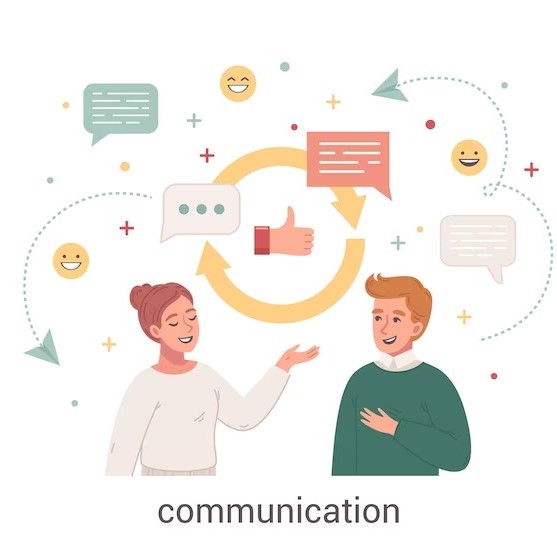When to Define the Relationship: Timing is Everything
When to Define the Relationship: Timing is Everything
When it comes to defining the relationship, timing is everything. Many people may be eager to jump right into exclusivity, but it's important to take the time to really get to know your partner and make sure they are the right fit for you. Rushing into a commitment can often lead to heartbreak down the road. It's important to establish a strong foundation of trust, communication, and compatibility before jumping into anything too quickly. One key factor in determining when to define the relationship is the level of emotional investment each partner has in the relationship. If one person is more invested than the other, it can lead to imbalances and potential hurt feelings. Taking time to ensure both parties are equally invested and committed can prevent future issues. Additionally, considering external factors such as timing (i.e. work schedules, personal goals) can also play a role in determining the right time to define a relationship.
Another important factor to consider when defining the relationship is communication. Open and honest communication is crucial in any relationship, but especially when defining it. It's important to have a direct conversation with your partner about where you both stand and what you are looking for in the relationship. This can help prevent misunderstandings and ensure both parties are on the same page. Additionally, discussing potential future plans (i.e. meeting family, traveling together) can help solidify the relationship and bring couples closer together. It's also important to remember that defining the relationship does not always have to mean exclusivity. Some couples may choose to have an open relationship, while others may prefer non-monogamy. It's important to have a clear understanding of what each partner wants and needs in the relationship before making any decisions. Allowing each partner to express their needs and desires can lead to a stronger, more fulfilling relationship in the long run.
Ultimately, the timing of defining a relationship should be based on what feels right for both people. There is no one-size-fits-all answer, as every relationship is unique. However, taking time to establish trust, communication, and compatibility can help determine when the time is right. Open and honest communication can also help prevent misunderstandings and ensure both parties are on the same page. Regardless of where you are in your relationship, defining it can bring clarity and a sense of security to both partners.
Understanding the Need for Clarification
The ability to communicate effectively is a critical skill in both personal and professional settings. However, misunderstandings can often arise due to a lack of clarity in communication. It is important to recognize the need for clarification and take the necessary steps to ensure that the intended message is being received accurately. By doing so, we can avoid confusion, frustration, and even possible detrimental consequences.
In order to achieve clarity, it is crucial to identify potential areas of confusion. This can involve analyzing the context, the audience, and the message itself. It is also important to consider the impact of language and cultural differences, as these can have a significant impact on interpretation. By taking these factors into account, we can tailor our communication to better meet the needs and expectations of the recipient.
Further, it is essential to use effective communication techniques to maximize clarity. These techniques can include active listening, paraphrasing, and asking clarifying questions. Additionally, we must be mindful of non-verbal communication such as body language, tone of voice, and facial expressions. By consciously utilizing these techniques, we can ensure that our communication is clear, concise, and effective in conveying our intended message.
Exploring the Reasons for DTR
Disordered eating is a complex issue that can have many underlying causes. One reason some individuals engage in dieting behaviors and restriction may be due to societal pressure to conform to certain beauty standards. This pressure can come from media, peers, or even family members. The idea that thinness equates to beauty and success is deeply ingrained in many cultures, and those who do not fit into that mold may feel shame or judgment. It is no wonder that some people turn to dieting in an effort to fit in and be accepted. However, this pressure can have serious negative consequences on mental and physical health.
For others, disordered eating behaviors may be a form of coping mechanism. If individuals experience trauma, stress, or anxiety, they may turn to food or dieting as a way to regain control over their lives. In some cases, this may escalate into a full-blown eating disorder. Additionally, perfectionism and the need for control can also play a role in disordered eating behaviors. Those who struggle with anxiety or obsessive-compulsive tendencies may find comfort in strict dietary rules and rituals.
A third reason for disordered eating behaviors may be related to genetic and biological factors. Research has shown that genetics can play a role in susceptibility to eating disorders, and abnormalities in brain function may contribute to the development of disordered eating behaviors. Additionally, certain medical conditions, such as PCOS or thyroid disease, may also contribute to weight gain or difficulty losing weight, which can lead to frustration and dieting behaviors. While much about disordered eating is still not understood, it is clear that a combination of societal, psychological, and biological factors can all come into play.
Analyzing Timing
Timing is crucial in almost all aspects of life. Whether it is in relationships, business or sports, getting the timing right can be the difference between success and failure. In business, timing is particularly important when it comes to launching new products, entering new markets or making business decisions. Timing can mean the difference between being first to market and being beaten to it. It can also impact how products are received and whether they are successful or not.
When it comes to relationships, timing can be even more important. It is not just about saying the right things, but also saying them at the right time. Telling someone you love them too early or too late can have negative consequences. Similarly, asking someone for a date at the wrong time can lead to rejection. In relationships, timing is about understanding the other person's needs and feelings and acting accordingly.
In sports, timing is critical in terms of making the right decisions at the right time during a game. A split-second decision can impact the outcome of a game or even a season. Knowing when to make an attacking move, when to defend and when to make substitutions is key to success. Timing is also important in terms of training and preparation. Being in peak physical and mental condition at the right time can make all the difference when it comes to winning tournaments and championships.
Why Wait to DTR?
In today's dating scene, the phrase 'DTR' has become a bit of a buzzword. But what does it mean? For those who may not be familiar with the term, 'DTR' stands for 'Define the Relationship.' Essentially, DTR is a conversation that two people have to determine the status of their relationship. While some may argue that it's best to wait for the 'right time' or 'perfect moment' to DTR, I strongly believe that it's better to have this conversation sooner rather than later.
Waiting too long to DTR can lead to misunderstandings and confusion. For example, if one person assumes they're in a committed relationship while the other still considers it casual, this can lead to hurt feelings and disappointment when the truth is revealed. On the other hand, having the conversation early on can ensure that both parties are on the same page and prevent any unnecessary heartache down the road.
Of course, it's worth noting that having a DTR conversation doesn't necessarily mean that you're committing to a long-term relationship. It's simply an opportunity to clarify where both of you stand and what you're looking for in a potential partner. By having this conversation early on, you can avoid wasting time and energy on someone who is ultimately not a good match for you. So, my advice? Don't wait to DTR - have the conversation as soon as you feel comfortable doing so.
The Risk of Moving Too Fast
Moving too fast can often feel like the exciting thing to do. Whether it's starting a new relationship, taking on a new job, or making a big life change, the rush of adrenaline that comes with making quick decisions can be exhilarating. However, moving too fast can also be incredibly risky. When you don't take the time to carefully consider the consequences of your actions, you run the risk of making poor choices that can have serious long-term effects. It's important to find a balance between taking risks and making smart, calculated decisions that will benefit you in the long run.
Another risk of moving too fast is that you may miss out on important opportunities. When you're focused on moving quickly, you may not take the time to fully explore all of your options or consider different paths that could lead to success. By rushing into things, you may also overlook potential pitfalls or red flags that could cause problems down the line. Additionally, moving too fast can cause you to overlook important details or fail to give adequate attention to important tasks. This can lead to mistakes, missed deadlines, and other consequences that can be difficult to recover from.
Perhaps the biggest risk of moving too fast is that you may end up feeling overwhelmed and burnt out. When you're constantly pushing yourself to move faster and accomplish more, it's easy to become exhausted and mentally drained. This can lead to a lack of motivation, decreased productivity, and even feelings of depression or anxiety. It's important to take time to rest and recharge, even when things are moving quickly. By prioritizing self-care and avoiding the urge to always be in go-mode, you'll be better equipped to handle challenges and make sound decisions in the long run.
Avoiding Misunderstandings
Misunderstandings can happen in any interaction between two parties. In order to avoid misunderstandings, it is important to communicate effectively. This means actively listening and paying attention to what the other person is saying. Additionally, when speaking, one should aim to be clear and concise in their language. Using vague or ambiguous language can lead to misunderstandings, especially if cultural or language barriers are present.
Cultural sensitivity is key when communicating with individuals from different backgrounds. Be aware of differences in communication styles and etiquette. Pay attention to non-verbal cues, such as body language and eye contact, as they can convey meaning as well. If you are unsure about something, don't be afraid to ask for clarification. It is better to ask a question than to make assumptions or jump to conclusions.
Written communication can also lead to misunderstandings if not executed properly. When writing an email or text, ensure that your message is clear, concise, and to the point. Avoid using excessive jargon or technical terms that may not be clear to the recipient. It is also important to proofread your message for grammatical errors or typos, as these can change the meaning of your message. If in doubt, ask someone else to read your message before sending it out.
Taking Responsible Risks
Taking responsible risks is a crucial aspect of personal and professional growth. It involves stepping out of your comfort zone and embracing the unknown, while also considering the potential consequences of your actions. Responsible risk-taking requires a balance between being bold and cautious. This means taking calculated risks that have the potential for positive outcomes while minimizing the likelihood of negative consequences.
Taking responsible risks can also lead to new opportunities and experiences. By exploring new possibilities, you can broaden your horizons and gain valuable insights that can help you achieve your goals. When taking responsible risks, it's important to have a growth mindset and to view failures as opportunities to learn and improve. This mindset can enable you to embrace challenges and rise above setbacks.
To take responsible risks, it's important to develop a plan and consider all possible outcomes. This means thinking critically about your decisions and considering both the short and long-term impacts of your actions. It also involves being honest with yourself about your strengths and weaknesses and seeking advice and support from others when needed. In this way, responsible risk-taking can help you develop a sense of accountability and resilience that can benefit you in various aspects of your life.
Exploring the Pros of Defining the Relationship
Defining the relationship can bring a lot of benefits in romantic relationships. One of the advantages is that clear communication of expectations helps to minimize misunderstandings and conflicts. When both partners are on the same page about what they want from the relationship, they can make informed decisions about how to proceed. For example, if one partner is interested in a casual relationship and the other wants a serious commitment, defining the relationship can help them either find a compromise or decide to end things before getting emotionally invested.
Another key advantage of defining the relationship is that it allows both partners to feel more secure and confident in the relationship. This comes from knowing that both partners are committed to the same goals and have the same level of investment in the relationship. Defining the relationship can also help with trust-building and intimacy, as it requires open and honest communication. When partners can communicate openly and vulnerably, they can establish a deeper level of trust and emotional connection.
Finally, defining the relationship can be an important step towards personal growth and development. When both partners are clear about what they want and need, they can work together to support each other's personal goals and aspirations. This can be particularly important in long-term relationships, where people's priorities and life plans may change over time. By having open and honest conversations about their needs and goals, partners can help each other navigate these changes and grow together as individuals and as a couple.
Learning the Cons of DTR
One of the cons of DTR, or Define the Relationship, is that it puts pressure on both parties to come up with a label for their relationship. This can lead to one person feeling rushed or forced into a commitment that they may not be ready for. It's also possible for the label to be inaccurate or not fully encompassing of the dynamic between the two people, which can cause confusion and misunderstandings.
Another con of DTR is that it can be a sign of insecurity or a lack of trust in the relationship. If one or both parties feel like they need a label to feel secure or validated in the relationship, it may indicate that they are not fully comfortable and confident in their connection. Additionally, if one person is pushing for a DTR while the other is hesitant or resistant, it can create tension and conflict in the relationship.
Lastly, a con of DTR is that it can put too much emphasis on labels and not enough on the actual connection and compatibility between the two people. While labels can be helpful for communication and clarity, they should not be the sole focus of a relationship. If both parties are more concerned with fitting inside a particular label than they are with enjoying each other's company and building a meaningful connection, they may be missing out on a truly fulfilling relationship.
Fostering Open Communication
Open communication plays a critical role in a healthy relationship. Without it, misunderstandings, conflicts, and resentment can fester and destroy even the strongest bonds. When individuals feel heard and understood, they are more likely to be satisfied and content in their relationships. In contrast, when communication is stifled, individuals may feel alienated and resentful, leading to relationship breakdowns.
One of the most important elements of fostering open communication is active listening. This involves giving your full attention to the speaker and acknowledging their thoughts and feelings. Active listening involves making eye contact, giving verbal cues such as nodding, and asking clarifying questions. By doing so, individuals convey to the speaker that they are important and that their thoughts and feelings are valid. Active listening requires effort, but the benefits for the relationship are immeasurable.
Another important element of fostering open communication is honesty. It can be challenging to be honest, especially when it comes to sensitive topics, but honesty is fundamental to building trust and intimacy. When individuals are not honest with each other, it creates a barrier to the relationship. Dishonesty breeds suspicion and mistrust, which can erode the foundation of even the strongest relationships. Being truthful may not always be easy, but it is necessary for fostering open communication and maintaining strong, healthy relationships.
Navigating Uncertainties and Dilemmas
Navigating uncertainties and dilemmas is an inevitable part of life, and it requires us to make difficult decisions with imperfect information. In many cases, we are faced with dilemmas that require us to balance competing values or priorities. For example, we may have to weigh the benefits of a certain decision against the potential risks and costs. It is crucial to approach these dilemmas with an open mind and a willingness to consider all perspectives. This requires careful reflection and a willingness to modify our assumptions and beliefs in response to new information or evidence.
Another important aspect of navigating uncertainties and dilemmas is the ability to manage our emotions and reactions. When faced with a difficult decision or situation, it is natural to experience feelings of anxiety, fear, or uncertainty. However, it is essential to remain calm and focused in order to make rational and well-informed decisions. One way to manage our emotions is to develop a support network of friends and family who can provide guidance and perspective. Additionally, practicing mindfulness techniques such as deep breathing or meditation can help us stay grounded and centered in the face of uncertainty.
Ultimately, the key to navigating uncertainties and dilemmas is to cultivate a growth mindset. This means embracing challenges as opportunities for learning and growth. Rather than being intimidated by uncertainty or discomfort, we can see these experiences as chances to expand our knowledge and understanding of the world. By approaching dilemmas with a growth mindset, we become more resilient and adaptable, able to navigate even the most complex and uncertain situations with confidence and grace.
Making an Informed Decision
When making an important decision, it is crucial to ensure that you have all the necessary information. This means taking the time to research and gather data about your options before making a choice. Whether the decision is related to your personal life or your professional career, you need to arm yourself with facts and figures to make an informed decision. By doing so, you can increase your chances of making the right choice and achieve your desired outcome.
One way to make an informed decision is by creating a list of pros and cons for each option. This exercise can help you weigh the advantages and disadvantages of each choice and identify which ones align best with your goals and values. Additionally, you can consult with experts or seek advice from individuals who have been in similar situations. By getting feedback from outside sources, you can gain a new perspective and insights that you may not have considered before.
It is also important to acknowledge any biases or emotional factors that may influence your decision. These can include personal preferences, fear of failure, or pressure from others. By being aware of these factors, you can work to mitigate their impact and ensure that your decision is based on logical reasoning and sound judgement. Ultimately, making an informed decision requires patience, diligence, and a willingness to consider all angles before moving forward with your choice.



